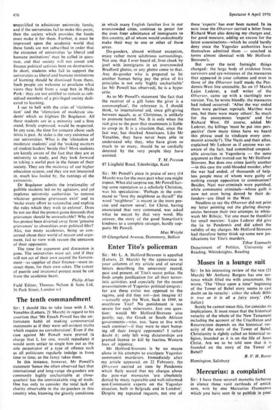Enter Tito's policeman
Sir: Mr L. A. Holford-Strevens is appalled (Letters, 21 March) by the appearance in your columns of my article and of several letters describing the unsavoury record, past and present, of Tito's secret police. He finds ample justification for all their terror- istic activities, and especially for the recent assassinations of Yugoslav political émigrés: for are these exiles not opposed to the regime, and did they not—just imagine itl —actually urge the West, back in 1949, to overthrow Tito? No punishment is too severe for such miscreants. Just one ques- tion: would Mr Holford-Strevens also justify, say, the Greek or South African governments—who, too, 'have to live with such enemies'—if they were to start bump- ing off their émigré opponents? I rather doubt it: only left wing dictatorships are granted licence to kill by fearless Western foes of injustice.
Mr Holford-Strevens is by no means alone in his attempts to exculpate Yugoslav communist murderers. Immediately after my article appeared, on 22 February, the Observer carried an item by Pendennis which flatly stated that my charges about the post-war massacres 'are absolutely denied by many reputable and well-informed non-Communist experts on the Yugoslav situation, both in Belgrade and in London'. Despite my repeated requests, not one of these 'experts' has ever been named. In its next issue the Observer carried a letter from Richard West also denying my charges and, for good measure, adding an excuse for the latest assassinations—which he could hardly deny since the Yugoslav authorities have themselves admitted them — couched in terms almost identical with Mr Holford- Strevens's.
But over the next fortnight things changed: the large body of evidence from survivors and eye-witnesses of the massacres that appeared in your columns and even in those of the Observer itself made the Pen- dennis-West line_untenable. So on 15 March Lajos Lederer, a staff writer of the Observer, came up with a startlingly new version. Yes, he wrote blandly, the massacres had indeed occurred: 'After the war ended there were partisan reprisals. Maribor was one, but there were many others'. So much for the anonymous 'experts' and for Richard West. Of course, added Mr Lederer, the killings 'must be put into pers- pective' (how many times have we heard this phrase used to vindicate every com- munist atrocity?). The Nazis and their allies, explained Mr Lederer as if anyone was un- aware of the fact, had committed unspeak- able atrocities in Yugoslavia — the same argument as that trotted out by Mr Holford- Strevens. But does one crime justify another —in this case the cold-blooded murder, after the war had ended, of thousands of help- less people most of whom were guilty of nothing except opposition to communism? Besides, Nazi war-criminals were punished, while communist criminals—whose guilt is now not even being denied by their de- fenders—are feted in the West.
Needless to say the Observer did not print my letter pointing out the glaring discrep- ancies between their two attempts to white- wash Mr Ribicic. Yet one must be thankful for small mercies: Lajos Lederer did give the lie to Pendennis and did admit the validity of my charges. Mr Holford-Strevens had therefore better think up some new jus- tifications for Tito's murders.
Tibor Szamuely Department of Politics, University of Reading, Whiteknights, Reading


































 Previous page
Previous page